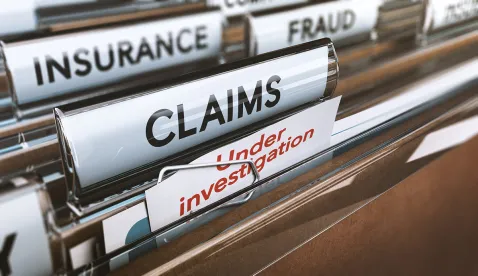In this exclusive expert video briefing from the IMS COVID-19 Research Insights Series, we speak with Commercial Insurance Industry Expert, Ty Sagalow, about professional liability claims and exposures as a result of the COVID-19 pandemic.
Chris Ritter: Hello, Ty. It's good to see you.
Ty Sagalow: Good to see you, Chris.
Ritter: I hope you're well. I hope your family's well and you're staying productive during this very strange time we're in.
Sagalow: I am. And you too.
Ritter: Yeah. Thank you. Ty, you've been doing insurance work for a good long time. I think probably close to forty years. And I know you have gone through a lot of what would be considered the prior disasters, hurricanes and earthquakes and fires and 9/11 and all that other stuff that have kept us on our toes over the last few years. But this is a unique situation, and I guess I'd like to talk with you about what you see are some of the issues as a result of the COVID-19 epidemic and all of the things that it's had and the effects that it's had on our lives.
Ritter: Let's come back in a few minutes to possible solutions because it sounds like you've spent some time thinking about that as well, which I think will be very interesting to talk about. I want to continue on where you started, where you listed categories of claims. Now, we've talked about some of the really interesting questions dealing with those first party insurance claims that we were talking about. But you raised other kinds of claims, things like officers’ and directors’ liability, broker liability, etc. Can you say a few words about how you see that developing?
Sagalow: Yeah. I mean, outside of coverage disputes, and again, we mentioned one and there are others like general liability and whatnot, many other types of coverage litigation that I am going to see. Let's talk about directors’ and officers’ liability. So, let's talk about two types there. First, let's talk about non-coverage issues associated with directors and officer’s liability and then we can mention some of the coverage issues that I see with directors’ and officers’ liability.
Sagalow: There has been at least, the last time I looked which was about four months ago, well over 100 cases against directors and officers alleging their liability. And again, D's and O's have personal liability for mismanagement of the companies that they run arising out of COVID-19. Many of these cases are against publicly traded companies or D's and O's, I should say, of publicly traded companies alleging nondisclosure in violation of the securities laws.
Sagalow: Let me just give you a few. These are all the ones that have hit the news. As a result of COVID-19 many of us have been using Zoom. In fact, we're using Zoom for this interview, right?
Ritter: Right.
Sagalow: And we've heard at the beginning that Zoom had some securities issues that they had to take care of, and they had to increase their level of encryption and they did that. But before they did that, what many people don't know, is that they got sued by their shareholders for not disclosing, allegedly, their less than adequate, this is according to their shareholders, level of encryption. So, when the news came up of the so-called Zoom bombing and other privacy concerns, organizations started prohibiting Zoom usage and the stock price of Zoom plummeted. That caused damage, of course, to the shareholders and they alleged a violation of 10B5 and 20A of the securities and exchange act of 1934.
Sagalow: Other shareholder actions against publicly traded companies that have hit the news is there was a pharmaceutical company that I won't name that allegedly told Trump that they could get a vaccine in three hours. Obviously, that wasn't true. So, when that came out as being untrue, their stock dropped, and they were sued. There was a company that allegedly disclosed that they could get a big supply of N95 masks. When that came out that that wasn't true, they got sued. And then, of course, there was the cruise company that was sued for not disclosing that they were aware of the virus and didn't tell anybody about it until afterwards. They delayed it by I forget how long. Actually, it could have been only a few days. But it doesn't really matter.
Sagalow: So, there's been many, many suits against directors and officers by shareholders against publicly traded companies and ones against privately held companies as well.
Ritter: Let's go back a little bit closer directly to insurance. As you were describing this, I'm thinking to myself what kind of liability do agents and brokers and people who may have helped sell these policies or helped place these policies potentially have?
Sagalow: That is, I think, one of the largest category of insurance related litigation that we're going to see because at the end of the day, if a big percentage of these business interruption cases and these other cases go against the policy holders, and there are many, as I'd mentioned besides business interruption that are going to be coverage issues, if a big percentage of those goes against the policy holders, policy holders are going to start blaming their brokers. And they're going to say their brokers should have sold them coverage or policies that covered these things, right?
Sagalow: And there are both defenses and vulnerabilities. So not to get too geeky here, so here's the good news and the bad news. So, the good news is that the law is generally on the side of brokers, which is as a general matter, and I'll take New York as an example because I'm a New York lawyer. But again, I'm an expert witness, as you know, so I speak from the point of view of custom and practice. But in New York, general agents really just have a duty to obtain the coverage that the clients ask them to. That's it. They have to obtain that coverage within a reasonable time and inform their client if they can't obtain the coverage.
Sagalow: They don't have a duty to advise or guide or direct the client. They are not the personal financial advisors. They don't guarantee coverage. They're basically order takers. That's the good news.
Sagalow: The bad news is, is that almost every broker I know does not project themselves that way. Because if you project yourself that way, you don't get a lot of business. Most brokers I know don't go to the client and say, "Listen, I don't really know anything. You tell me what you want and then I'll get it for you. That's it. Tell me what you want." That's not the way to make a lot of money in this life. So, most brokers directly or indirectly give the impression to clients that they actually know what they're doing, that they are a risk advisor.
Sagalow: And the problem with that is that when you go down that road, you develop what many courts call a special relationship. And when you develop a special relationship, you start having duties to actually be the person that you say that you are. And then you get in trouble. The other way you get in trouble is there's a natural inclination to want to help your client. So, if the client says to you, "I'm losing money. I'm shut down. You got to do something." There's a natural inclination to say to the client, "Don't worry. I'll figure this thing out. You're going to be okay."
Sagalow: Now, every lawyer will tell you this is a dumb thing to say. People say it anyway because you want to help. Because if you don't help, the person's going to run away. This gets you in trouble. So, in the real world, brokers say a lot of things that are going to get them sued. In addition to that, there are and has been since 2013 standalone insurance policies that cover the very thing that people want. Very few people have bought it, but that doesn't mean they weren't available and that doesn't mean that a broker that really did his due diligence or her due diligence wouldn't have found them.
Sagalow: So there's an argument that a broker that projects themselves as saying, "I can help you get the coverage that you really need, which would include coverage for business interruption arising out of viruses," could actually have found that coverage. Now, it was very expensive. The client might have said no. But now the client is going to say, "You didn't even tell me it existed. And by the way, I found out it actually did exist. You didn't give me the option to say no."




 />i
/>i

